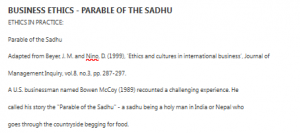BUSINESS ETHICS – PARABLE OF THE SADHU

ETHICS IN PRACTICE:
Parable of the Sadhu
Adapted from Beyer, J. M. and Nino, D. (1999), ‘Ethics and cultures in international business’, Journal of
Management Inquiry, vol.8, no.3, pp. 287-297.
A U.S. businessman named Bowen McCoy (1989) recounted a challenging experience. He
called his story the “Parable of the Sadhu” – a sadhu being a holy man in India or Nepal who
goes through the countryside begging for food.
As the story begins, McCoy was in the mountains of Nepal on his way to a village considered a
holy place, with an American anthropologist named Stephen, a Sherpa guide, and a group of
porters. To get to the village, they had to climb across a mountain pass at 18,000 feet (about
5500 meters). The night before the planned climb they camped at around 15,000 feet near
several other groups: four young men from New Zealand, two Swiss couples, and a Japanese
hiking club.
At 3:30 the next morning, the New Zealanders got the first start up the mountain. The American
party left next, followed by the Swiss, while the Japanese lingered in their camp. When the
Americans reached about 15,500 feet, Stephen began to feel ill and they stopped to rest. Soon
thereafter one of the New Zealanders appeared with a body slung over his back. It was a sadhu
he had found on the mountain-almost naked and unconscious, clearly suffering from
hypothermia, but still alive. The New Zealander suggested the porters traveling with the
Americans take the old man down the mountain and then went back to join his group. Stephen
and the Swiss couples attended to the sadhu, stripping off his wet clothes, wrapping him in
clothing from their packs, and giving him food and drink when he revived.
Meanwhile, the businessman McCoy was growing anxious about the delay because he feared if
he waited any longer to resume his climb, the sun would melt the steps carved in the snow that
he needed to help him cross the mountain pass. Adding to his worry was the fact that he had
previously suffered quite severe altitude sickness at a lower altitude. Neither of these concerns,
however, led him to abandon his goal. He was still determined to cross the mountain pass and
reach the sacred village. So he left to catch up with some of the porters who had gone ahead to
prepare the way. His friend Stephen, who was still not feeling well, and the Swiss couples
stayed behind with the sadhu.
An hour or so later, after climbing most of the way, McCoy himself became dizzy and stopped
to rest, allowing the Swiss to catch up with him. He asked them about the sadhu and was told he
was fine and that his friend Stephen was on his way. When Stephen finally arrived he was
suffering from altitude sickness and could only walk 15 steps at a time before resting. He was
also very angry and accosted McCoy, saying, “How do you feel about contributing to the death
of a fellow man?”